-
Countries
-
Data and Analysis
-
Special Focus
-
Crisis Responses

Contact
DTM Pakistan, iomisbdtmremapteam@iom.int
Language
English
Location
Pakistan
Period Covered
Jul 02 2022
Jul 15 2022
Activity
- Flow Monitoring
IOM Pakistan collects data on the outflows of undocumented Afghan migrants at the Torkham and Chaman border crossing points in an effort to better understand the migration movements of undocumented Afghan migrants returning to Afghanistan from Pakistan. This exercise is part of the European Union funded project “Displacement Tracking Matrix Regional Evidence for Migration Analysis and Policy (DTM REMAP)”. From 02 to 15 July 2022, 1,478 undocumented Afghan migrants returned to Afghanistan from Pakistan, including 588 through the Torkham border point and 890 through the Chaman border point. During the reporting period, border authorities facilitated the return of 36 individuals due to the lack of legal documentation to remain in Pakistan. Therefore, information concerning these 36 individuals is not included in the report analysis.
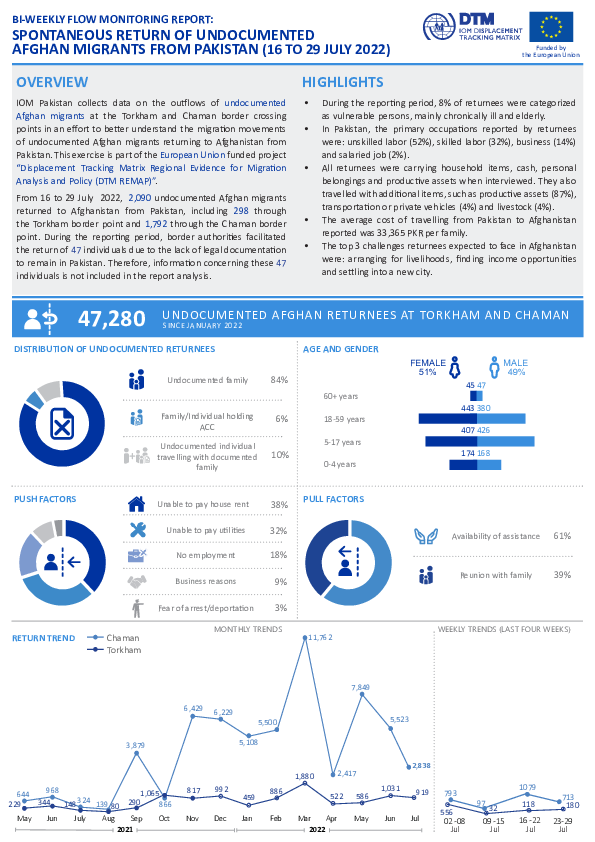
Contact
DTM Pakistan, iomisbdtmremapteam@iom.int
Language
English
Location
Pakistan
Period Covered
Jul 16 2022
Jul 29 2022
Activity
- Flow Monitoring
IOM Pakistan collects data on the outflows of undocumented Afghan migrants at the Torkham and Chaman border crossing points in an effort to better understand the migration movements of undocumented Afghan migrants returning to Afghanistan from Pakistan. This exercise is part of the European Union funded project “Displacement Tracking Matrix Regional Evidence for Migration Analysis and Policy (DTM REMAP)”. From 16 to 29 July 2022, 2,090 undocumented Afghan migrants returned to Afghanistan from Pakistan, including 298 through the Torkham border point and 1,792 through the Chaman border point. During the reporting period, border authorities facilitated the return of 47 individuals due to the lack of legal documentation to remain in Pakistan. Therefore, information concerning these 47 individuals is not included in the report analysis.
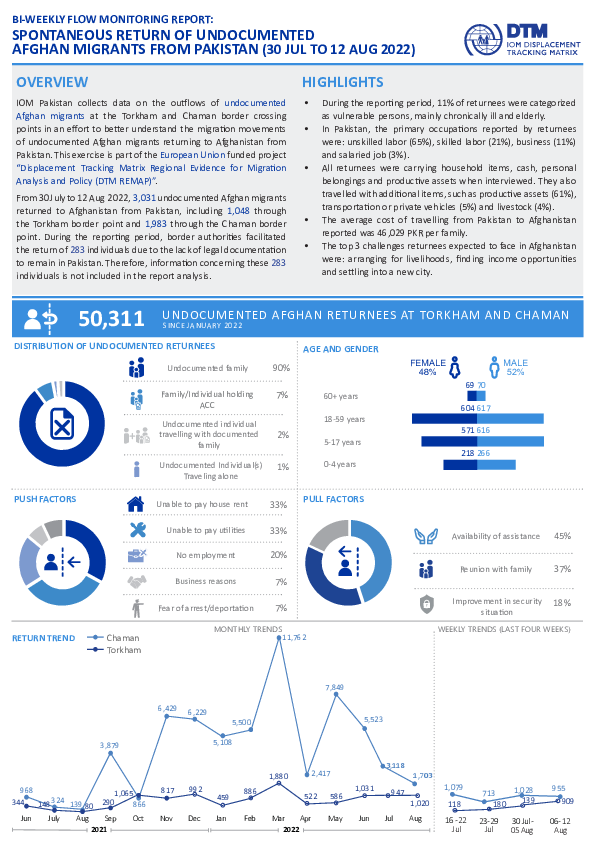
Contact
DTM Pakistan, iomisbdtmremapteam@iom.int
Language
English
Location
Pakistan
Period Covered
Jul 30 2022
Aug 12 2022
Activity
- Flow Monitoring
IOM Pakistan collects data on the outflows of undocumented Afghan migrants at the Torkham and Chaman border crossing points in an effort to better understand the migration movements of undocumented Afghan migrants returning to Afghanistan from Pakistan. This exercise is part of the European Union funded project “Displacement Tracking Matrix Regional Evidence for Migration Analysis and Policy (DTM REMAP)”.
From 30 July to 12 Aug 2022, 3,031 undocumented Afghan migrants returned to Afghanistan from Pakistan, including 1,048 through the Torkham border point and 1,983 through the Chaman border point. During the reporting period, border authorities facilitated the return of 283 individuals due to the lack of legal documentation to remain in Pakistan. Therefore, information concerning these 283 individuals is not included in the report analysis.
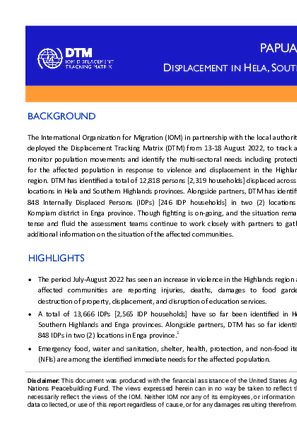
Contact
DTM Papua New Guinea, iompngmdac@iom.int
Language
English
Location
Papua New Guinea
Period Covered
Aug 13 2022
Aug 18 2022
Activity
- Mobility Tracking
- Baseline Assessment
The International Organization for Migration (IOM) in partnership with the local authorities deployed the Displacement Tracking Matrix (DTM) from 13 - 18 August 2022, to track and monitor population movements and identify the multi-sectoral needs including protection for the affected population in response to violence and displacement in the Highlands region. DTM has identified a total of 12,818 persons [2,319 households] displaced across 78 locations in Hela and Southern Highlands provinces. Alongside partners, DTM has identified 848 Internally Displaced Persons (IDPs) [246 IDP households] in two (2) locations in Kompiam district in Enga province. Though fighting is on-going, and the situation remains tense and fluid the assessment teams continue to work closely with partners to gather additional information on the situation of the affected communities.

Contact
DTM Mali, DTMMali@iom.int
Language
French
Location
Mali
Period Covered
May 01 2022
Jul 31 2022
Activity
- Flow Monitoring
Afin de mieux comprendre les tendances des mouvements transhumants et l’impact des fragilités sur les communautés transhumantes, l’OIM, à travers la Matrice de suivi des déplacements (DTM), a déployé depuis juillet 2021 l’outil de suivi de la transhumance (Transhumance Tracking Tool - TTT). Ce rapport présente les données d'alertes collectées entre mai et juillet 2022 au niveau des six points de comptage qui ont été retenus au Mali : Séguéla, Djélébou dans le cercle de Kayes; Kremis dans le cercle de Yélémané; Gavinane dans le cercle de Nioro; Korongo et Falou dans le cercle de Nara.
L’outil de suivi des alertes permet de recueillir des informations sur des événements et des mouvements soudains (précoce) ou inhabituels de bétail dans la cadre de la transhumance. Il a pour but d’obtenir des informations précises sur le nombre, le type et les caractéristiques de mouvements, qui permettraient de lancer des alertes dans l’optique de prévenir un éventuel conflit qui pourrait avoir lieu dans le cadre des mouvements de transhumance.
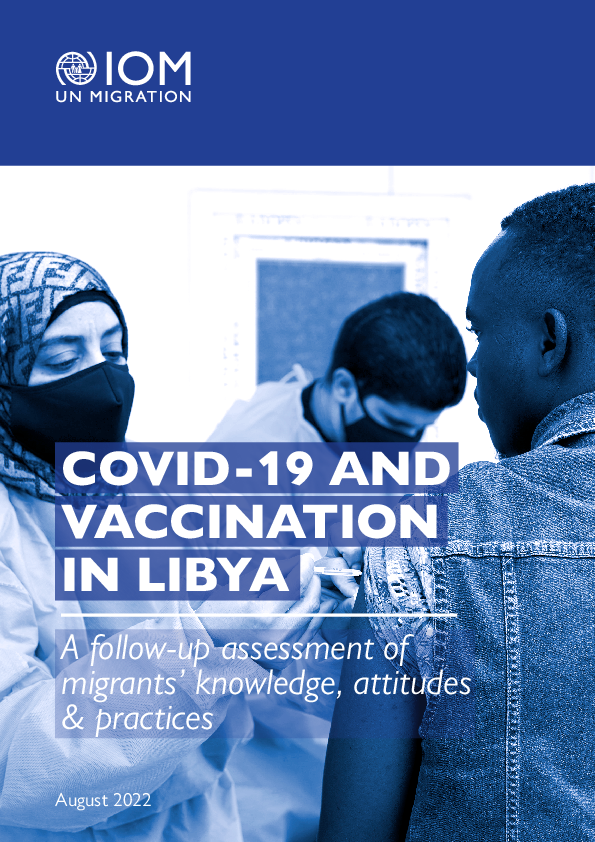
Contact
DTM Libya, DTMLibya@iom.int
Language
English
Location
Libya
Snapshot Date
Aug 29 2022
Activity
- Other
DTM Libya’s latest study "COVID-19 and vaccination in Libya: A follow-up assessment of migrants’ knowledge, attitudes and practices" aims to shed light on what migrants in Libya know, their beliefs, and practices in relation to COVID-19 with the objective to inform risk communication and community engagement (RCCE) activities. This report also provides an overview of migrants’ perception and attitude towards COVID-19 vaccines, their willingness to get vaccinated and their perceptions on potential barriers faced in accessing vaccinations in Libya.
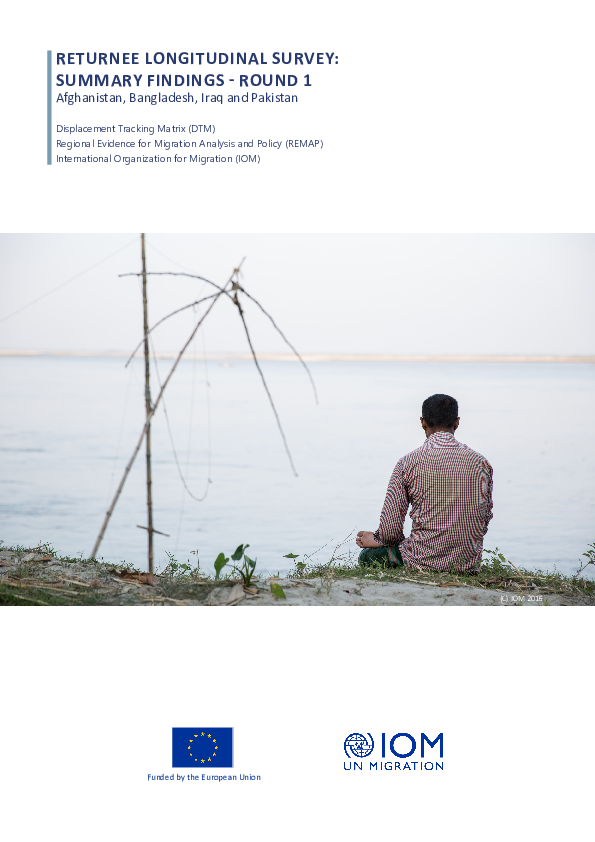
Contact
DTMAfghanistan@iom.int
Language
English
Location
Afghanistan
Period Covered
Aug 01 2020
Aug 01 2021
Activity
- Other
To better understand the demographic profiles, living conditions and reintegration processes of returnees, IOM, under the EU-funded project “Displacement Tracking Matrix Regional Evidence for Migration Analysis and Policy (DTM REMAP)”, developed the Returnee Longitudinal Survey (RLS). This report intends to provide summary findings of the first round of RLS data collection that took place in Afghanistan (May to August 2021), Bangladesh (October 2020 to January 2021), Iraq (August to September 2020) and Pakistan (January to April 2021). While the RLS also collects data on the sustainability of reintegration (economic, social and psychosocial), this summary report solely focuses on the analysis and comparison of data collected in the four countries on the profiles of the returnees. The specific thematic areas for analysis under this report include: socio-demographic background, employment status, income status, debt status, migration drivers, return journey and prior migration experience and re-migration intentions.
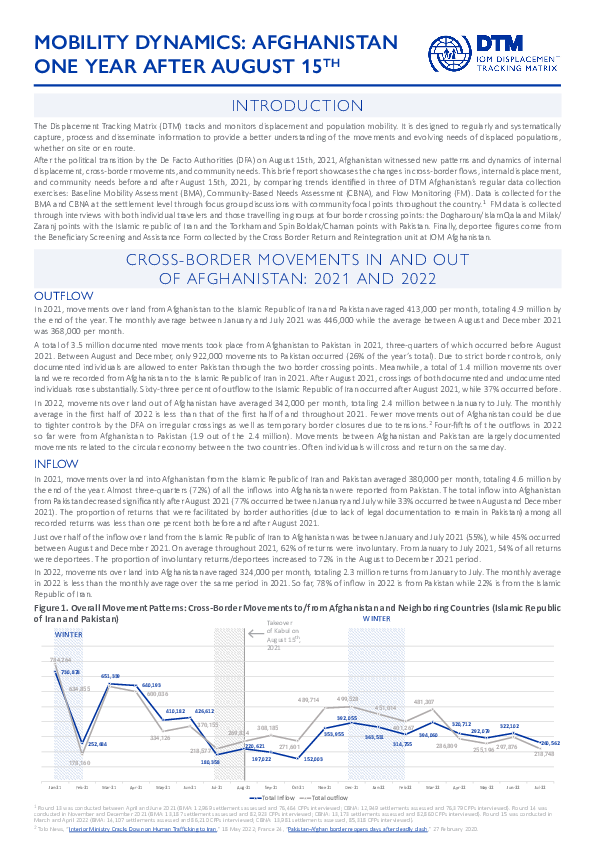
Contact
DTMAfghanistan@iom.int
Language
English
Location
Afghanistan
Period Covered
Aug 15 2021
Aug 15 2022
Activity
- Other
After the political transition by the De Facto Authorities (DFA) on August 15th, 2021, Afghanistan witnessed new patterns and dynamic of internal displacement, cross-border movements, and community needs. This brief report showcases the changes in cross-border flows, internal displacement, and community needs before and after August 15th, 2021, by comparing trends identified in three of DTM Afghanistan’s regular data collection exercises and complimentary data-sources.
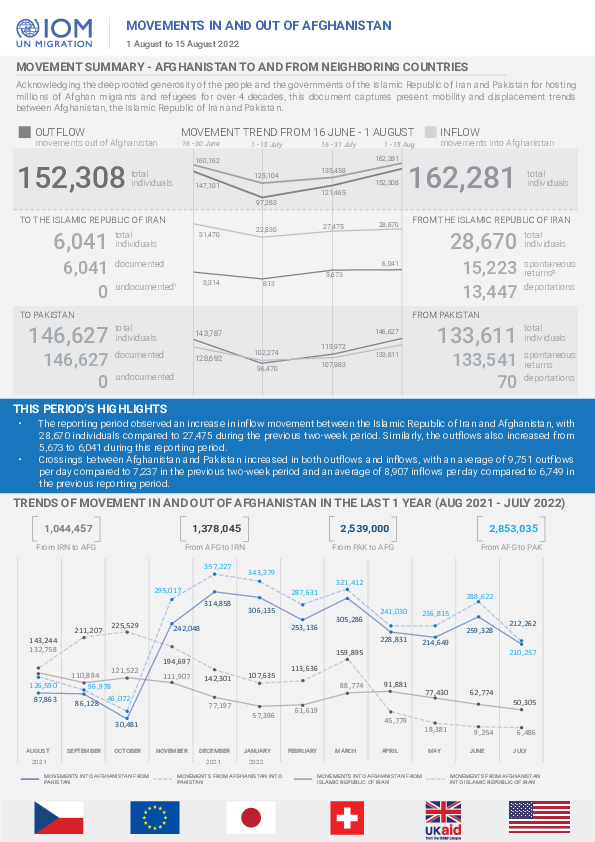
Contact
DTMAfghanistan@iom.int
Language
English
Location
Afghanistan
Period Covered
Aug 01 2022
Aug 15 2022
Activity
- Flow Monitoring
The snapshot captures present mobility and displacement trends between Afghanistan, the Islamic Republic of Iran and Pakistan.
Aug 29 2022
Print
Duty Station
Remote - Deliverable Based
Number of positions
1
Starting Date
As soon as possible
Type
Consultant
Closing Date
2022-09-11
Status
Open
I. BACKGROUND
Humanitarian response should be based on relevant, reliable data, as well as a shared understanding of context and needs. However, even when data and analysis are produced with the aim of informing a response, they are not always fully utilized or some necessary data may be missing. This depends on several factors, including insufficient and unstructured engagement of data users and other actors during the data collection planning, analysis and dissemination phases. This often results in resources being invested in collecting data that does not fully correspond to the information needed by decision makers.
The DTM & Partners Toolkit contains practical tools and guidance to a common approach that supports DTM and partners obtain useful and usable data and analysis in their humanitarian response.
It is the implementation of the joint outcomes of the EDAUUR WG. The Working Group on Useful and Usable Data and Analysis (EDAUUR) under the Grand Bargain work stream on Needs Assessments developed tools and guidance to address these challenges. The EDAUUR WG was composed of:
- Global Clusters and AoRs (including the Global CCCM Cluster, the Global Child Protection AoR, the Global Education Cluster, the Global Food Security Cluster, the Global GBV AoR, the Global Health Cluster, the Global Protection Cluster, the Global Shelter Cluster, the Global UNICEF Cluster Coordination Team and the Global WASH Cluster)
- UN Offices and Agencies (including UNHCR FICS, IOM DTM, WFP VAM, OCHA FIS and OCHA NAAS)
- Donors (including DIFD, ECHO and OFDA)
- NGOs (including DRC, Geneva Centre for Humanitarian Demining, MapAction, REACH – Impact and Terre Des Hommes Lausanne) and
- Other organizations and initiatives (including ACAPS, JIPS, PIM, IDMC and ICRC)
The approach proposed by EDAUUR WG aims at structuring engagement between data producers and data users before, during and after the data collection, analysis and dissemination processes. This approach will help humanitarian responders obtain information they can use through effective, predictable and clear engagement of all necessary actors according to their roles and skillsets. Data and analysis obtained through a predictable process with clear roles and responsibilities will provide responders with the right information to make decisions and better meet the needs of affected populations. Outcomes and Tools of the EDAUUR WG available online at: https://interagencystandingcommittee.org/system/files/ensuring_data_and_analysis_is_useful_and_usable_for_response_-_tools.pdf
DTM & Partners Toolkit and the EDAUUR Approach
DTM and Partners began implementing and operationalizing the results from EDAUUR’s work by jointly developing a toolkit that applies the approach developed by the working group to the work of DTM teams and Partners in the field to support cooperation.
DTM worked with the many Partners, including: Global CCCM Cluster, Global Child Protection AoR, Global Education Cluster, Global GBV AoR, Global Health Cluster, Global Protection Cluster, Global Shelter Cluster, Global UNICEF Cluster Coordination Team, Global WASH Cluster, Geneva-based Cash Working Group, Global AAP and PSEA experts from IOM, the IASC Task Force and Translators Without Borders. Partners are those who participate in the humanitarian response, and include Clusters, Sectors, WGs, NGOs, International Organizations, Authorities, UN agencies, IOM Programmes and more.
A Common Objective: The common objective of DTM and Partners is to ensure that DTM collects data that Partners can use. After common challenges faced by field colleagues were identified, DTM and Partners worked jointly to find ways to overcome said challenges. The resulting approach and tools are now in the jointly developed and publicly available DTM & Partners Toolkit (https://displacement.iom.int/dtm-toolkit/dtm-partners-toolkit).
In line with the results of the EDAUUR work, a predictable approach was defined to be consistently rolled out in all responses. The approach is based on the common assessment process, which was identified by EDAUUR Partners as commonly recognized as effective, as well as agreed upon by most actors.
Tools:
The DTM & Partners Toolkit contains tools that facilitate implementation in the field: presentations on DTM; methodology documents; FAQs; lists of DTM datasets used for strategic, programmatic and operational decision-making; guides on the effective use of DTM data for specific sectors; and the DTM Field Companion. The Field Companion is an analysis plan for DTM Multi Sectoral Location Assessment information needs and proposed question phrasing in English, that were agreed upon by DTM and Global Clusters, AoRs and WGs; it links information needs to appropriate questions, analysis and use of results.
Approach and main tools are included in the DTM & Partners Cooperation Pocket Guide available at: https://displacement.iom.int/dtm-partners-toolkit/predictable-approach. An exemplification illustrated in comics is also available at the same link.
Based on feedback from DTM and Partners during the last two years, a report was produced, and a new version of the Toolkit will be developed starting from October 2022. This position supports the improvements to the toolkit.
II. PROJECT CONTEXT AND SCOPE
Supporting the development of new version of DTM & Partners Toolkit.
Under the direct supervision of the Senior DTM Coordination Officer and the overall supervision of the Global DTM Coordinator, the successful candidate will support, with guidance by the Snr Data and Analysis Quality Advocate, on reviewing, adjusting and drafting tools and on Capacity Building activities for DTM and Partners colleagues in the field
III. DELIVERABLES
By end of October 2022:
- Complete the Skill Development Pathway on Data and Analysis for Protection (SDP-DAP) standard training course (first 10 days)
- Upload all new tools - developed so far- to DTM and Partners Toolkit
- Revise all existing Toolkit material to ensure consistency in visuals and text in line with visual guidelines
- Tag all existing Toolkit documents for search function
- Support in the organization, facilitation and follow up of online SDP DAP training sessions
By end of November 2022:
- Develop or review new and adjusted tools following Work Sessions with Snr Data and Analysis Quality Advocate and partners, Document changes made and rationale
- Upload new tools to DTM and Partners Toolkit and Tag them
- Draft and Record introductions and explanatory material for website
- Update the interactive section of the toolkit weekly
- Create and Manage Internal and external mailing lists for dissemination of news on the Toolkit
By end of December 2022:
- Develop or review new and adjusted tools following Work Sessions with Snr Data and Analysis Quality Advocate and partners, Document changes made and rationale
- Upload new tools to DTM and Partners Toolkit and Tag them
- Draft and Record introductions and explanatory material for website
- Update the interactive section of the toolkit weekly
- Create and Manage Internal and external mailing lists for dissemination of news on the Toolkit
- Prepare dissemination material and social media posts for Toolkit page and new tools with guidance by the Communication Consultant
- Support the drafting and revision of the IOM Practical Guidelines on Protection Information Management and Assessments in Emergencies
- Ensure translations of training packages in relevant languages are verified
IV. EDUCATION
Advanced university degree (Master's degree or equivalent) in social sciences, communication, adult learning, development, international relations, economics or a related field. A first-level university degree in combination with an additional two years of qualifying experience may be accepted in lieu of the advanced university degree.
V. QUALIFICATIONS AND EXPERIENCE
- A minimum of two (2) years of progressively responsible experience in the Humanitarian, development sectors or knowledge management, learning or communication
- Experience in effective communication and writing in English (Provide 2 samples)
- Experience in communication and training across cultures
- Excellent writing skills in English
- Outstanding attention to details and a strong drive to achieve results
- Excellent people’s skills and communication abilities, ability to actively listen and use logic and creativity to develop effective communication/training tools
- Ability to organize own workload and meet tight deadlines, to work independently once objectives are clear and to ask for guidance when needed, respecting instructions and deadlines.
- Ability to work remotely and flexibility on adapting working hours to different time zones
- Ability to use Excel at intermediate level, Excellent use of MS Power Point and Word
Desirable:
- Work experience in humanitarian or development response with an NGO, a UN agency, or other international organization, and in the Cluster system
- Work experience in Information Management, Assessment, Analysis, data management or related fields
- Work experience in Protection, or GBV, Child protection, Disability Inclusion
- Work experience with vulnerable groups
- Combined field and office experience
VI. LANGUAGES
Required:
- Fluency in English, oral and written
Advantageous:
- Fluency in one of the following: Russian, Spanish, French or Arabic (oral and written)
- Fluency in one or more non-European languages
How to apply
Interested candidates may submit their applications in only one PDF file, including cover letter and CV, no later than 9th September 2022 at dtmrecruitment@iom.int adding "DTM & Partners Toolkit Consultancy" in the subject line.
NOTE: Due to the high volume of applications, only shortlisted candidates will be contacted.
HOW TO APPLY
Interested candidates may submit their applications in only one PDF file, including cover letter and CV, no later than 11th September 2022 at dtmrecruitment@iom.int adding "DTM & Partners Toolkit Consultancy" in the subject line.
NOTE: Due to the high volume of applications, only shortlisted candidates will be contacted.